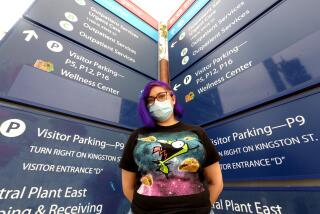Clinic Gives Youths Lessons in Self-Esteem : Center Has Been Helping Troubled South-Central Children for 70 Years
- Share via
Some students liken it to day camp, an easy getaway from the hassles of school with a few fun day trips. A few others say it’s like a prison, with too many restrictions and not enough freedom to do what they want.
But few of these young people deny that they learn something at the Los Angeles Child Guidance Clinic--either academic or about themselves.
For 70 years, the clinic has used a mixture of group and individual counseling and small classrooms to work with youths who are emotionally disturbed, are abused or have behavioral problems. The goal is to help them work through their problems by raising their self-esteem and getting them back into the mainstream either in school or a job.
“I’m definitely doing things different since I’ve been here, like I used to use profanity a lot and I still cuss a bit, but not like I did before,” said 17-year-old Derek, who had been in and out of detention centers since he was 13. “And math used to be my worst subject, but now I’m getting A’s.”
Derek’s calm voice and his respect for his teacher, Audrey Coleman--whom he calls Granny--belie the violent temper for which he is known. In the month that he has been at the clinic, he has been working one-on-one with a counselor and has made it a goal to keep his cool and direct himself in other ways.
“People try and push my buttons and test me, but I’m learning now to pull back and not be so quick to hit someone first,” Derek said. “And I’m also learning that I’m a leader, not a follower. Like Granny, she’s always encouraging me to talk to other kids because sometimes they listen to me.”
The nonprofit clinic, which started in 1924 as the first operation of its kind west of the Mississippi River, is the only agency in South-Central that provides comprehensive mental health services for emotionally disturbed or abused young people. Its 100 clients, the majority of whom are Latino and African American, range in age from 18 months to 21 years.
“With the clients we serve, you have a series of behaviors and symptoms--like schizophrenia, depression and paranoia--from incidents or organic situations (such as babies born addicted to crack cocaine) that impair them in different parts of their lives,” said Cecilia Johnson, director of clinical programs.
Half of the youths who attend classes and counseling sessions at the clinic are referred by the Los Angeles Unified School District. An additional 40% are referred by the county Department of Children’s Services and the remainder by the county Department of Mental Health and the state Department of Rehabilitation, Johnson said. These agencies also fund some of the clinic’s services.
Because of the circumstances that bring some youths to the clinic, confidentiality is vital, Johnson said. Students are referred to only by their first names for many visitors. Those names have been changed in this story.
The clinic had been based for 30 years in a small West Adams facility, offering individual, group and family therapy; parent and guardian counseling; child abuse and neglect prevention; a preschool for 2- to 5-year-olds with behavioral and emotional problems; after-school treatment for elementary school children, and adolescent day treatment with an on-site junior and senior high school.
The continuing rise in the number of young people and children being referred to the clinic created a need for more services and more space.
“We had a tenfold increase in services between 1975 and 1985, but there was no way to physically accommodate these needs,” said executive director Elizabeth Fromm. “We were holding classes in rooms not constructed as classrooms and had no rooms to devote to our adolescents.”
In May, the clinic moved to a new building on Vermont Avenue near Exposition Boulevard, a peach-colored three-story facility of administrative and therapy offices, classrooms, a multipurpose room and a small playground.
Funded by $9.4 million in private contributions, the new 40,000-square-foot facility has allowed the clinic to expand its outpatient mental health services by 50%, add classes for junior high school children and decrease the number of students in each class to allow for more personalized attention, Fromm said.
What many of the students need is a sympathetic ear and, most important, someone to believe in them so they can believe in themselves, said Coleman, a 42-year teaching veteran who joined the clinic’s staff last September.
“This is someplace they need to be, because we do a lot of one-on-one to build self-esteem. And self-esteem is so important to these students,” she said.
During his month at the clinic, Derek has decided that he wants to be a psychiatrist.
“For me, this place has been good,” he said. “It’s helped me see that once I get on my feet that I can really do things to help people.”
More to Read
Sign up for Essential California
The most important California stories and recommendations in your inbox every morning.
You may occasionally receive promotional content from the Los Angeles Times.










